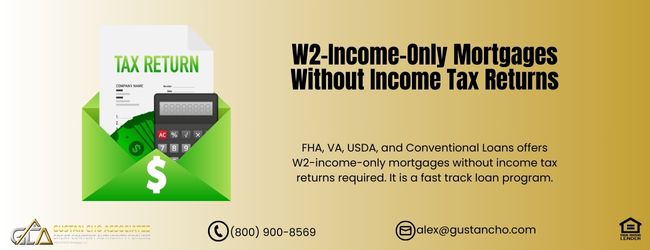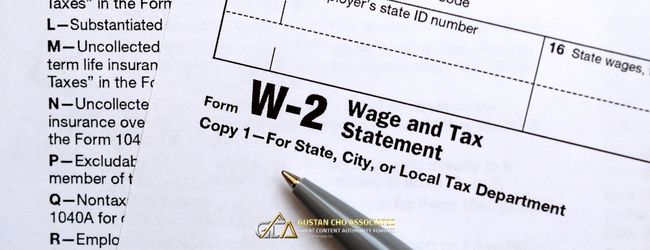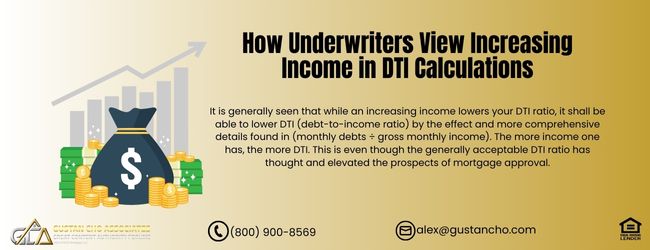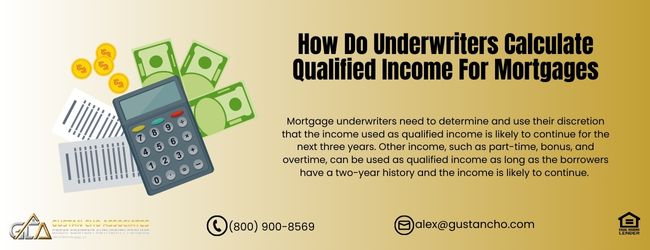W2-Income-Only Mortgages Without Income Tax Returns

This guide covers qualifying and getting approved for W2-income-only mortgages without income tax returns. FHA, VA, USDA, and Conventional loans offer W2-income-only mortgage without income tax returns. Each one of us always has a dream of owning a place we can call our own. However, today, the desire to possess such a place can easily be thwarted by the challenges of meeting stringent income verification requirements, usually put in place by lenders trying to protect themselves from defaults. There is good news for borrowers whose primary income stems from W-2 wages. FHA, VA, USDA, Fannie Mae, and Freddie Mac offers a more innovative solution. What are we talking about? The W2-income-only mortgage with no income tax returns. In the following paragraphs, we will cover W2-income-only mortgages on FHA, VA, USDA, and conventional loans.
W2-Income-Only Mortgages on Government and Conventional Loans
Traditional mortgage programs often rely heavily on income tax returns to assess an applicant’s financial stability and ability to repay the loan. Posing a significant obstacle for individuals whose financial situations may not align with the tax returns they file.
FHA, VA, USDA, and conventional loans offer W2-income-only mortgages. However, FHA loans is the most popular W2-income-only mortgages without income tax returns required. Fortunately, HUD recognizes the diverse nature of income sources and strives to make homeownership accessible to a broader range of aspiring homeowners. We will talk about this in this article tells you about the FHA W2-income-only mortgage, its definition, purpose, eligibility requirements, loan limits, terms, and anything else you should know about these mortgages.
What are FHA W2-Income-Only Mortgages?
By definition, the FHA W2-Income-Only Mortgage is a type of home loan product offered by the FHA that is specially designed to help borrowers who receive their income primarily from W-2 wages rather than self-employment or other sources to qualify for a mortgage. The primary purpose of this loan is to make homeownership accessible and realizable for individuals who have a steady W2-income but may not have significant savings or a high credit score. Since many Americans are under the W2 wage system, focusing on this income means that many more people can easily purchase homes and build equity over time. Speak With Our Loan Officer About FHA W2-Income -Only Mortgage
What Are The Eligibility for W2-Income-Only Mortgages?
To be eligible for an W2-income-only mortgagea, one must meet the following requirements: Borrowers must have a documented employment history of at least two years. This employment should be consistent, with no significant gaps or job changes. Most borrowers’ income should come from W-2 wages. This means that income from self-employment or other sources may be considered, but it should not be the primary income source. A borrower should have a reasonably good credit score, typically a minimum FICO score of around 580 on FHA loans. However, specific credit score requirements may vary among lenders.
DTI Guidelines on W2-Income-Only Mortgages on FHA Loans
The borrower is also required to have a manageable level of debt relative to their income. HUD requires a maximum DTI ratio of 46.0% front-end and 56.9% back-ends on FHA loans, although some lenders may allow lower ratios due to lender overlays. HUD manual underwriting guidelines allow up to 40% front-end and 50% back-end DTI with two compensating factors. The property being purchased must meet specific criteria the FHA sets, such as being a primary residence and meeting minimum property standards for safety and habitability.
Terms of W2-Income-Only Mortgages
Regarding the loan terms and limits, HUD sets loan limits that determine the maximum amount borrowers can borrow under this program. These limits vary from location to location, are based on the median home prices in each area, and are updated annually. Regarding loan terms, W2-income-only mortgages typically offer favorable terms, including lower down payment and more flexible credit requirements than conventional mortgages. The down payment requirement is generally 3.5% of the purchase price. The terms, such as the interest rate and repayment period, will depend on the specific lender and the borrower’s financial profile. Fannie Mae and Freddie Mac require a 620 credit score and up to a 50% debt-to-income ratio on conventional loans. VA loans does not have a minimum credit score or maximum debt-to-income ratio cap. USDA loans require a 29% front-end and 41% back-end debt-to-income ratio. There is no minimum credit score requirement on USDA loans.
Streamlining The Home-Buying Process
In mortgage underwriting processes, nothing consumes more than income verification. For context, income verification is crucial in the mortgage application process, allowing lenders to assess an individual’s ability to repay the loan. Lenders want to ensure borrowers have a stable and sufficient income to make timely mortgage payments. Chad Bush, a dually licensed loan officer and real estate agent with GCA FORUMS Mortgage Group explains how W2-Income-Only Mortgages work as follows:
Traditionally, income verification has heavily relied on tax returns, which provide a comprehensive overview of an individual’s income history—with that said, how does the W2-income-only mortgages simplifies income documentation?
For starters, placing a greater emphasis on W-2 wages makes it easier for borrowers with stable employment to qualify for a mortgage. Unlike other mortgage programs that primarily rely on income tax returns, the W2-income-only mortgages program allows borrowers to provide W2 forms as the primary proof of income, bypassing the complex and time-consuming process of gathering extensive tax documentation. Speak With Our Loan Officer for Mortgage Loans With Low Credit Scores
Benefits for Borrowers with Stable W2-Only-Income
W2-Income-Only Mortgages offers several benefits for borrowers with stable W2 income but limited tax returns. They include the following:
- Access to homeownership – for borrowers who rely on W2 wages as their primary income source, this program provides an opportunity to fulfill their dream of homeownership. It recognizes the value of consistent employment and allows borrowers with limited tax returns to showcase their financial stability.
- Simplified documentation process – by accepting W2 forms as the primary income verification, these FHA Mortgage simplifies the documentation process. You no longer need to navigate the complexities of tax returns, reducing the paperwork and saving time during the application process.
- Increased qualification possibilities – borrowers with stable W2 income but limited tax often face challenges in meeting traditional mortgages; strict income verification requirements. However, the W2-income-only mortgages widens the scope of eligibility, allowing these borrowers to qualify for a mortgage based on their reliable employment history.
- Enhanced affordability – this program opens doors to more affordable financing options by easing the income documentation process. Borrowers with limited tax returns may still have strong earning potential from their W2 wages. W2-income-only mortgages allows them to leverage their stable income to secure more favorable loan terms, including lower down payment requirements and competitive interest rates.
What You Need to Consider on W2-Income-Only Mortgages
With these considerations, you can make an informed decision about the feasibility and affordability of W2-Income-Only Mortgages. You can consult with lenders, compare loan offers, and conduct a thorough financial evaluation, all of which will determine if this program aligns with your long-term homeownership goals. When planning to take up W2-income-only mortgages, there are a few things that you need to consider, including:
- Interest rates and associated costs – when considering W2-income-only mortgages, you should consider the interest rates lenders offer. Interest rates can vary according to the market conditions, the borrower’s creditworthiness, and the lender’s policies. So, shopping around and comparing rates from different lenders is essential to secure the most competitive rate. Moreover, you should consider the mortgage cost, including origination fees, appraisal fees, title insurance, and other closing costs. This way, you will be able to budget effectively and determine the overall affordability of the loan.
- Debt-to-income ratio requirements – like other mortgage programs, W2-income-only mortgages typically imposes debt-to-income (DTI) ratio requirements. DTI compares a borrowers’ monthly debt payments to their gross monthly income, which helps lenders assess the borrower’s ability to manage additional mortgage payments. W2-income-only mortgages generally sets a maximum DTI ratio depending on the mortgage loan program. Although some lenders may allow higher ratios with compensating factors. However, you should evaluate your current debts, including student loans, credit cards, and other obligations, to ensure you meet the DTI requirements. Remember, keeping the DTI ratio within acceptable limits enhances your chances of loan approval.
- Impact on mortgage insurance premiums – W2-income-only mortgages on FHA loans requires borrowers to pay mortgage insurance premiums (MIP) for the duration of their loan. FHA MIP serves as insurance coverage for the lender in case of borrower default. There are two different kinds of FHA MIP on FHA loans. FHA mortgage insurance premium is typically divided into an upfront premium, which can be financed into the loan amount, and annual premiums paid monthly as part of the mortgage payment.
With that said, borrowers should consider the impact of MIP on their monthly payments and overall loan costs. The exact amount of MIP will depend on factors such as the loan-to-value ratio, loan term, and down payment amount. So, it’s essential to understand the MIP structure and factor it into the overall affordability assessment.
How to Apply for W2-Income-Only Mortgages
On the other hand, pre-approval involves a more detailed assessment of your financial situation and a conditional commitment from the lender. The lender will review your documentation, assess your creditworthiness, and determine W2-Income-Only Mortgages eligibility. The pre-approval or prequalification will help you when hunting for properties, as you can trim down your search to only those within your price range, and the sellers will see you as a serious buyer. Applying for W2-Income-Only Mortgages involves several steps, which include the following:
- Find a Mortgage Lender – the first step is to identify a mortgage broker or lender that offers the W2-Income-Only Mortgages. You can search for approved lenders online, through referral sources, the U.S. Department of Housing and Urban Development (HUD) website, the Veterans Administration website, USDA Rural Development USDA loans website, Fannie Mae, or Freddie Mac website or consult a mortgage broker specializing in government and conventional loans with no lender overlays.
- Gather documentation – after selecting a lender, you will need to gather all the necessary documentation to support the application before you submit it. These documents include the following;
- W2 forms – you must gather your W-2 forms from the last two years to show your income and taxes withheld.
- Employment verification – obtain verification documents of your employment history, such as a letter from your employer or recent pay stubs.
- Tax returns – even though the W2-Income-Only Mortgages doesn’t require tax returns, having them on hand can be beneficial if your income situation is more complex or if the lender requests them for additional documentation.
- Financial statements – prepare bank statements, investment account statements, and other documents demonstrating your financial stability.
- Prequalification or pre-approval – after gathering all the required documents, you can submit your application, and the lender will begin the prequalification or pre-approval process. Prequalification gives you an estimate of the loan amount you may qualify for.
- Complete the loan application – once you’re ready to proceed, complete the official loan application provided by the lender. This application will require personal information, employment details, income information, and details about the property you intend to purchase.
- Appraisal and property evaluation – the lender will then arrange for an appraisal of the property to assess its value and ensure that it meets government loan or conforming loan standards. Through this appraisal process, you can determine the loan amount you qualify for based on the property value.
- Loan approval and closing – if the lender determines that you meet all the requirements, they will provide loan approval. The final step is the closing process, where you sign the loan documents, pay closing costs, and officially become the property owner
.The lender may request additional documentation during the underwriting process, meaning you must be prepared to provide any additional information promptly. This may include bank statements, employment verification forms, or other supporting documents. Speak With Our Loan Officer for W2-Income Only Mortgage
What are Potential Drawbacks of W2-Income-Only mortgages?
While W2-income-only mortgages offer many benefits, there are potential drawbacks and challenges that you need to keep in mind, even as you plan to submit your application. They include the following:
- Loan limits – first, the FHA and conventional sets loan limits, which may restrict the maximum loan amount you can qualify for based on the property location. You may need to explore alternative mortgage options to purchase a higher-priced home.
- Mortgage Insurance Premiums (MIP) – as previously mentioned, these FHA loans require borrowers to pay MIP for the loan duration. This amount is meant to protect the lender in case the borrower defaults. However, it is an additional cost that can increase your monthly mortgage payment and overall loan expenses. Fannie Mae and Freddie Mac require private mortgage insurance if you have less than 20% equity.
- Property eligibility – Each loan program has specific property requirements, including minimum property standards and restrictions on certain types of properties (such as investment properties or co-ops). Therefore, you must ensure that the property you plan to purchase meets agency property standard guidelines.
- Debt-to-income ratio (DTI) requirements – although FHA W2-Income-Only Mortgages is more flexible with income documentation, it still imposes DTI requirements. If you have a high level of existing debt or a high DTI ratio, you may face challenges in qualifying for the loan.
Alternative Mortgage Options
W2-Income-Only Mortgages can benefit individuals with limited resources or unique financial situations. When you select an alternative loan option, consult a mortgage professional or loan officer who can assess your circumstances and guide you toward the most suitable option.
- Conventional mortgages – if you have a higher credit score and a substantial down payment, you may consider applying for a conventional mortgage. Conventional loans often have more stringent income verification requirements but offer various loan programs tailored to different financial situations. Maximum debt-to-income ratio on W2-income-only mortgages on conventional loans is 45% DTI for borrowers under 700 credit scores. Borrowers with higher than 700 credit scores, the maximum debt-to-income ratio cap on conventional loans is 50% DTI.
- Non-qualified mortgages (Non-QM) – non-QM loans cater to borrowers with unique circumstances, such as self-employed individuals or non-traditional income sources. These loans may have more flexible underwriting criteria and documentation requirements, although they typically have higher interest rates.
- Portfolio loans – some lenders offer loans that government agencies do not back. These loans are typically held in the lender’s portfolio instead of sold on the secondary market, allowing for more flexibility in underwriting and accommodating borrowers with unique circumstances.
State and local homebuyer assistance programs – many states and localities in the country offer homebuyer assistance programs that provide down payment assistance, closing cost assistance, or low-interest loans to eligible borrowers.
The Future of Lending on W2-Income-Only mortgages
As we head into the future, mortgage lending will likely change and align with broader mortgage financing trends, affecting all mortgages, including the W2-income-only mortgages. With that said, here are some of the evolving trends to know;
- Digital mortgage experience – the mortgage industry increasingly embraces digital technologies to provide a seamless and convenient mortgage experience. Borrowers can expect a streamlined online application process, digital document submission, and automated underwriting, reducing paperwork and saving time.
- Expanded data sources – lenders are exploring alternative data sources beyond traditional income verification methods to assess borrowers' creditworthiness and income stability. This may include analyzing data from utility bills, rental payments, and bank transactions to provide a more comprehensive view of a borrower’s financial profile.
- Enhanced automation – while automation and artificial intelligence are taking over the world in almost every sector, the mortgage sector isn’t being left behind. Lenders are utilizing the technology to try and improve the efficiency and accuracy of income verification. They are deploying advanced algorithms to analyze income data, detect patterns, and make predictions, enabling faster and more accurate assessments of borrowers’ ability to repay loans.
- Improved accessibility – lastly, mortgage lenders are making efforts to increase accessibility to homeownership for a broader range of borrowers. This may include expanding eligibility criteria, offering more flexible loan terms, and providing educational resources to help borrowers navigate the mortgage process. These developments are great as they will provide borrowers with a more streamlined and accessible path to homeownership while still maintaining the necessary safeguards for lenders.
As we conclude, if you have a stable W2 income but limited tax return documentation, W2-income-only mortgages is, quite frankly, a promising solution to your homeownership desires. This unique mortgage program recognizes the evolving landscape of income verification and aims to simplify the home-buying process for those who may face challenges in providing traditional income documentation.
Benefits of Getting Approved W2-Income-Only Mortgages
Some borrowers have a reliable income, but their tax returns are not extensive, making it challenging to qualify for many loans. However, by leveraging W2 forms and verifying employment history, the W2-income-only mortgages program makes their home ownership desire realizable. But even with all these benefits, there are a few drawbacks that you need to be aware of. And when possible, you can always explore the alternatives. Ultimately, by embracing innovation, flexibility, and inclusivity, W2-Income-Only Mortgages contributes to a more robust and dynamic mortgage market that caters to the unique financial situations of borrowers, empowering them to embark on their homeownership journey with confidence and ease. Get a mortgage broker or loan officer today, and you will almost be guaranteed success in your investment plans. Get Approvable For W2-Income-Only Mortgage, Click Here
FAQs on W2-Income-Only Mortgages
Below is a FAQ regarding W2-Income-Only Mortgages Without Income Tax Returns:
What are W2-Income-Only Mortgages?
Answer:
- W2-Income-Only Mortgages are a type of mortgage loan processed based on the W2 forms and P.E., for instance.
- This option is suitable for W2 salaried or hourly workers with uncomplicated incomes.
- Borrowers of W2-income-only mortgages do not have to experience great difficulties or delays in tax returns for loans with related matters, such as high tax deductions.
- However, more employees will likely be puzzled by that fraction and the tax loss.
Who Can Qualify For W2-Income-Only Mortgages?
Answer:
- These are self-employed W2 employees with verifiable consistent income and can access the borrowed amount.
- A few of these typically comprise salaried specialists.
- Whether on a commission, a few bipartisan self-employed persons, employees with restricted self-employment income, or earnings that are legitimately subject to taxes and cannot verify even more without filing the necessary paperwork.
- It is a construction norm that lenders tend to say that for a borrower to be awarded a loan, they have to have adequate income and stable income to facilitate the repayment of loans in terms of the debt-to-income ratio.
What Paperwork Are Needed for W2-Income-Only Mortgages?
Answer:
- Attach commonly necessary documents, including W2 Forms, for about two years.
- Pay stubs from the latest 30 days.
- Employment verification order to determine continuous income.
- Also, bank statements are used to verify assets and funds for a down payment.
- Lenders may also ask for the borrower’s credit report.
- Some Lenders want to assess the borrower’s capacity to repay the loan and the amount of other liabilities the borrower has.
Why Isn’t it Necessary To Submit Income Tax Returns for W2-Income-Only Mortgages?
Answer:
- In W2-Income-Only Mortgages, tax returns cannot be submitted for W2 employees.
- The lenders accept W2 forms and pay stubs verifying the borrower’s income.
- This condition makes approval easier among W2 employees.
- This is especially true since tax returns will likely have depreciation or extra additive income, making the qualifying curves relatively steep.
What Benefits Will a Homebuyer Who is Shopping For a Home Loan Obtain W2-Income-Only Mortgages?
Answer:
- The benefits include simplified documentation.
- Borrowers will no longer be referred to as tax return providers.
- Which offloads a burden off the borrowers and could also be a merit to the speed at which the loan market is syndicating.
Lesser Qualification is Needed for W2 Employees
- Such income qualifies the employee since it is quite straightforward.
- The lenders only look at the W2 tax report and the payslip.
Suitable for High-Deduction Borrowers
- If the borrower cannot report sufficiently high taxable income.
- This is because there are many tax deductions in the borrower’s tax returns.
- This can qualify the borrower for a W2-Income-Only Mortgage based on gross income.
What Are The Set Credit Limits for W2-Income-Only Mortgages?
Answer:
- Different lenders have different scoring systems regarding the minimum required credit score for lenders in the U.S.
- However, in most cases, the minimum credit score for conventional loans is 620.
- People with credit scores over 620 who have made significant progress in accurately managing their credit scores stand to benefit from a better lender offer, such as low interest.
- Apart from the requirements, a non-QM program often does impose a credit check but tends to be more expensive.
Which Programs Offer W2-Income-Only Mortgages?
Answer:
- Foundation to W2-Income-Only Mortgages.
There Other Mortgage Programs, More Than One
- Conventional loans. If submitted under certain terms, Fannie Mae and Freddie Mac AUS provide W2-only income documentation.
- FHA loans: FHA lenders will not turn away other supporting factors but approve W2-only documentation on the borrower in certain situations.
- VA Loans: VA loans offer W2-income-only mortgages.
- USDA Loans: USDA loans offer W2-income-only mortgages.
- Non-QM loans: This category primarily caters to borrowers who can service the loan. Possess W2 income and can meet the minimum mortgage requirements.
Is it Possible to Obtain W2-Income-Only Mortgages Even if the Applicant is Self-Employed?
Answer: No, these are targeted to W2 employees only. Self-employed applicants must do the same, except they must submit more documents, such as tax returns and profit and loss statements, to substantiate their income claim.
Is it Permissible to Consider Bonuses or Overtime When Calculating the Income to Qualify for W2-Income-Only Mortgages?
Answer:
- Yes, where is bonus or overtime income available?
- It can be used for loan qualification as long as it is reliable or persuasive.
- Bonuses or overtime payment records should be accrued for two years before lenders can approve a loan, as evidenced by W2/form 108 or pay stubs.
What Are the Debt-to-Income (DTI) Requirements for W2-Income-Only Mortgages?
Answer:
- The lenders tend to prefer a DTI ratio of.
- DTI of 50% or less in the case of conventional loans.
- In cases where the borrower’s DTI is 43%, and there are strong compensating factors like a good credit score, large down payment, etc., a DTI ratio of 43%- 50% could be acceptable.
Are There Any W2-Income-Only Mortgages Demerits?
Answer:
- Although these are among the advanced strategies to use when obtaining mortgages.
- Some disadvantages still exist with good prospects.
Loss of Other Income:
- It is easier if a borrower has more W2 income qualifications, such as rental or part-time income. Still, no tax returns must be provided to access it.
More conservative ways of determining disposable income
- Lenders tend to use more conservative estimates regarding the ‘qualified income.’
- This is especially true for lower-income earner borrowers due to the instability of their incomes, which are based on bonuses or overtime pay.
Higher rates for non-QM loans
- A few non-QM lenders are expected to impose more than what is charged on a typical mortgage.
- This is especially true for W2-Income-Only Mortgages, where the borrower has yet to supply other documentation due to the possibility of other risks on the borrower’s ability to repay non-QM loans.
How Will I Go About Applying for W2-Income-Only Mortgages?
Answer.
- Obtain all the required paperwork for the application, such as W2s and the most current pay stub.
- Find lenders or mortgage brokers that offer W2-Income-Only loan programs.
- Complete the loan application and provide the appropriate documentation.
Stay in contact with your lender during the closing process, during which the lender verifies your employment and credit history. Generally, it is speedy for people on salary or hourly wage to qualify for a W2-Income-Only Mortgages without some income tax returns. This also caters to people with a simple income structure or individuals who claim huge tax deductions. W2s and pay stubs speed up and simplify the process of providing the necessary information to the lender regarding DTI and credit score provisions. Speak With Our Loan Officer for Mortgage Loans







Responses